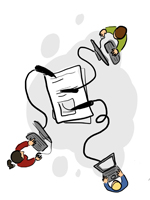Pattern: Online Collaboration

Context/Setting
This pattern has been tested in small to medium-sized courses. Participants may be distributed across different locations. They are expected to create, discuss, collect, and/or compile content in smaller groups or as a whole. The focus is on the active engagement with a topic, the application of knowledge, and the joint production of content.
Problem
When collaborating in a group, students can quickly lose track of deadlines, files, and versions of a document. Organizing the group is difficult, and communication often runs through a group leader. It is challenging to merge different parts of a group project, and simultaneous work on a submission is hardly feasible.
Tension
Learning objectives vs. personal goals, group dynamics, online vs. offline
Solution
Tools for online collaboration support group formation, group organization, and joint content creation. Versioning of content and shared file storage ensure that all participants are always using the latest files. Communication tools allow discussions to be conducted transparently and openly.
Details
The core is the joint development of content. Hypertexts, mind maps, individual documents, or graphics can be collaboratively created. This can occur simultaneously or asynchronously. For group formation, planning, and mutual feedback, participants need to communicate with each other or with the instructor. Tools for group registration, forums, chat, or audio-video transmission are available for this purpose. Finally, presentation or submission of the completed work to other students and the instructor is possible.
Pitfalls
Online collaboration requires a certain level of media competence from participants and the course leader. The operation of the tools must be addressed in the introduction.
As with other group work, typical problems such as free riding, lack of adoption, social conflicts, etc., should be moderated using the available communication tools
If the group happens to be in one location, there is a tendency to only enter the final result into the tool, nullifying some of the mentioned advantages.
Advantages
All participants work on a document, even from distributed locations. Versioning is typically fully automatic. This collaboration can also occur simultaneously on the same document. The instructor can provide feedback and moderation at any time, even on interim results. Group organization is supported by tools (formation, communication, file exchange, deadlines, etc.).
Disadvantages
Communication is not complete (nonverbal cues and body language are usually missing). Misunderstandings may occur. Moderation can become quite demanding, as flawed group processes become quickly apparent. See Pitfalls.
Examples
In the module "Anatomy, Physiology, Pathology" in the Department of Chemistry, participants collaboratively create a wiki for exam preparation. In the first session, participants receive an introduction to OLAT and working in the wiki. During the semester, each participant must present a disorder on a wiki page. By the end of the course, the wiki contains all relevant content for the colloquium.
For the seminar "Perspectivity in Audiovisual Media," the instructor chose to use the AGORA (CommSy) plugin “pmwiki” to document discussions and results from the seminar on a website. The AGORA team initially discussed the scenario with the instructor and then trained her and her tutor to use the wiki. A session at the beginning of the semester introduced seminar participants to the wiki, enabling them to independently write and design their text contributions. This was supported by close email support for questions. The result was an online presence that effectively conveyed essential foundations on the topic of perspectivity in film while meeting academic criteria. The wiki is now often used by instructors as an alternative assessment instead of term papers.
Tools
- Wiki (CommSy, OLAT)
- Forum (CommSy, OLAT)
- Acrobat Connect (OLAT)
- EtherPad (eLearning Lab, CommSy)
- Online mind mapping tools
- Discover applications of HedgeDoc (collaborative pad)
Related Patterns
- Online Communities
- User-generated Content
